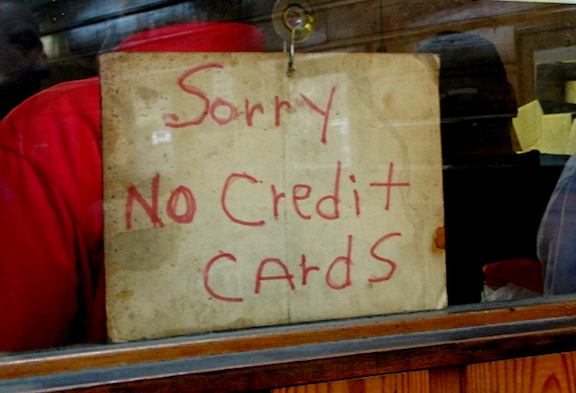CFPB: College Credit Card Agreements On Decline; Debit, Prepaid Card Agreements Increase
Since Congress passed the Credit Card Accountability, Responsibility, and Disclosure (CARD) Act in 2009, the cozy relationship between credit card issuers and institutions has fractured. But while the number of agreements between the two entities has declined drastically, that doesn’t mean banking on campus has gotten any safer for students.
The Consumer Financial Protection Bureau’s annual report [PDF] on college credit card agreements highlights the new trends in the marketing partnerships between colleges and financial institutions when it comes to the products they offer students and the transparency of their agreements.
![The number of agreements between colleges and credit card issues has decreased dramatically. [Click to Enlarge]](../../../../consumermediallc.files.wordpress.com/2014/12/agreements.png%3Fw=300&h=166)
The number of agreements between colleges and credit card issues has decreased dramatically. [Click to Enlarge]
In 2013 alone, the number of agreements declined from 403 at the beginning of the year to 336 at year-end.
Additionally, the amount of money issuers paid in royalties and bonuses to colleges and universities decreased. In 2009 colleges collected $84 million, while the agreements brought in just $43 million last year.
According to the CFPB, the drastic changes in regards to credit card agreements likely occurred in part because of the CARD Act, which requires issuers to disclose to the CFPB the terms and conditions of any college credit card agreement, the number of new credit card accounts, and the compensation paid by issuers to institutions of higher education in the previous year.
But as the saying goes; when one door closes, another opens. And that has apparently been the case for banking institutions and colleges.
Now, instead of signing onto agreements for the more regulated credit cards, the groups are focusing on debit and prepaid cards, which generally have fewer consumer protections.
In fact, a report from the Government Accountability Office earlier this year found there were at least 852 schools that had agreements with companies to market debit or prepaid cards to students in 2013.
Unlike credit cards, these products do not have specific requirements in federal consumer financial laws to disclose marketing partnerships, making them a popular product for financial institutions.
While the cards provide a convenient way for schools and universities to outsource the process of paying financial aid and other funds, the fees and accessibility for students has been an area of concern for regulators.
In its February report the GAO found that fees charged by college card providers were similar to fees incurred by bank-issued debit cards. The report also found several instances in which schools or card providers encouraged students to enroll in a college card without showcasing neutral information about payment options.
In addition to shifting from credit to debit or prepaid cards, agreements for financial products have also shifted from connecting universities and issuers to connecting alumni associations and issuers.
Back in 2009, agreements between issuers and institutions were the most common type of college credit card agreement, accounting for 40% of such agreements. At the time, alumni associations accounted for just 33% of all such agreements.
Today, alumni agreements account for more than 50% of all college card agreements, while institution agreements accounted for 26%.
According to the CFPB, the remainder of agreements are with foundations, a combination of the aforementioned organizations and other organizations affiliated with institutions of higher education.
Although credit card agreements are on the decline for many colleges and universities, those who do offer the products continue to lack proper transparency when it comes to providing copies of the agreements to students, the CFBP found.
Under the CARD Act, institutions of higher education are required to publicly disclose any agreement made with a credit card issuer or creditor for the purpose of marketing a credit card.
To comply with the requirement colleges and universities can post any relevant credit card agreement on their website or by make it available free of charge upon request by students.Of the 35 college and university websites the CFPB examined, only seven make the documents readily available.
The Bureau found that 80% of the institutions looked at do not put their agreements, or information about how to request them, on their websites.
Officials with the CFPB say that while credit card agreements have declined in recent years, the increase of debit and prepaid card agreements, as well as a continued lack of transparency, the topic of college financial products will remain a significant issue for regulators.
Consumer advocates echo the need to continue vigilantly monitoring agreements between credit cards issuers and institutions of higher education and expanding protections to debit and prepaid cards.
“Students deserve to know whether their school stands to profit from financial products being marketed on campus,” Suzanne Martindale, a staff attorney for our colleagues Consumers Union says in a statement. “Federal regulators should make sure schools are following the law by disclosing credit card agreements to the public and these same reporting requirements should apply to debit and prepaid cards.”
Want more consumer news? Visit our parent organization, Consumer Reports, for the latest on scams, recalls, and other consumer issues.



![The number of agreements made publicly or readily available is still lacking. [Click to Enlarge]](../../../../consumermediallc.files.wordpress.com/2014/12/transparency.png%3Fw=300&h=265)